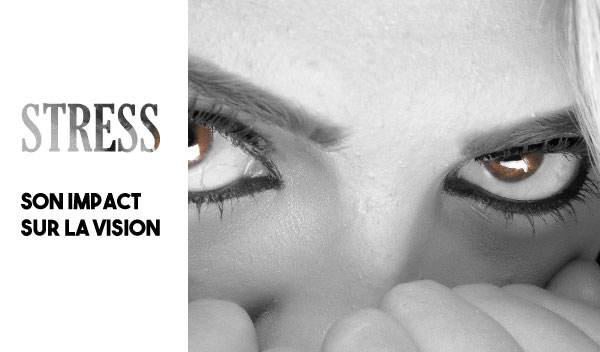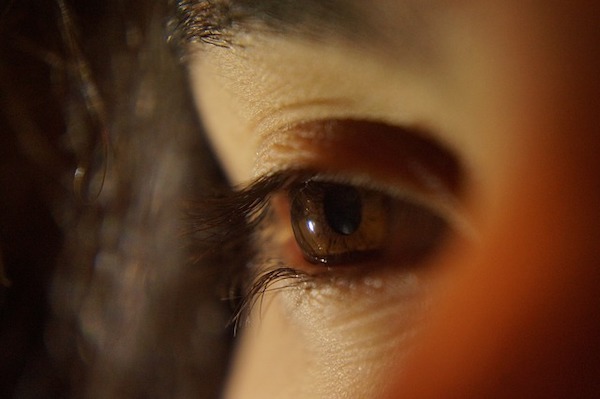DOSSIER Stress: its impact on vision

Stress can have multiple causes, take multiple forms, cause multiple consequences. We often notice that there is also a correlation between our stress and the way our body reacts. Yet it is very difficult for us to put our finger on what causes these unfortunate consequences. One thing is certain, all parts of our body are linked, and the visual system is no exception to this rule. How is the impact of stress on vision marked?
Stress: three elements for a vicious circle
Stress is defined as 'a reflex reaction, both psychological and physiological, of the body when faced with a difficult situation which requires adaptation'. If this definition seems random, it is also because there is as much stress as there are people. What we now know is that for there to be a state of stress, a combination of three elements is needed:
- The stressor
- The stress response
- Attitude
The stressor is its source, a 'physical, mental, social or emotional stimulus arises to which one has to adjust'. It is important to note that this one is not necessarily negative. Indeed, it can even be a source of immense happiness. It can be one-off (an unforeseen event) as well as constant (too much work over several years).

The stress reaction is quite simply the physical reaction that the brain will 'program' in front of this agent. This is where there are many differences. Because this reaction can materialize on all parts – internal or external – of our body. Above all, it is not often easy to pinpoint a stressor, this situation that causes us this reaction.
Indeed, it is not uncommon to imagine, in the first place, that you have a physical problem, an illness that manifests itself without being able to do anything about it. And this will greatly affect the third element, our attitude to this reaction.
The attitude is once again indefinable in a clear and precise way, so much do we react to stress reactions. . It will depend on our personality, our education, our personal choices. Above all, attitude is directly related to the intensity of the stress reaction. For example, the stronger the latter, the less our attitude will turn to patience.
Because the great force of stress is to operate a vicious circle in us. A situation causes a physical reaction that we are usually unaware of, triggering a negative attitude that makes the situation worse.
Stress and vision: a close relationship
Sight experiences a direct or indirect reaction to stress. Indeed, under the effect of a stress that we will call 'immediate or direct', our pupils dilate because the body sends out an adrenaline rush. This rapid effect is a response of the body to prepare for various attacks: our eyes will perceive more light.

But too frequent stress will have perverse effects: in chronic stress, the pupils dilate too often and can lead to blurred vision or intense fatigue . Too intense stress over a longer or shorter period also has the ability to increase intraocular pressure, an increase conducive to the appearance of glaucoma for example.
We can now easily associate certain symptoms linking stress and vision. This is of course a non-exhaustive list, but the most frequent are the following:
- Blurred vision
- Light sensitivity
- Myokymia or eyelid spasms
- Reduced vision
- Dry eye
- Headache
- Visual fatigue
- Appearance of floaters
Indirect reactions of stress on our vision
As we mentioned earlier, there is an indirect relationship between stress and its consequences on vision. Indeed, stress can lead to varied and multiple reactions. And some of them can affect vision.
Stress has the ability to increase blood pressure, which is the pressure exerted by blood on the walls of different vessels . Whether too strong (hypertension) or too weak (hypotension), it is often a sign of stress and affects nearly a third of the population.
[= ] 
High blood pressure tends to affect many parts of the body, of which the eyes are no exception. In fact, this can be characterized by hypertensive retinopathy due to too much fluid accumulation under the retina. The optic nerve is thus damaged. A serious consequence is the cardiovascular accident of the retina (stroke of the eye).
These effects of stress, if not treated in time, can be very severe. severe and lead to vision loss. Fortunately, other symptoms, such as those listed above, appear before and 'force' patients to consult.
Low blood pressure also has negative effects on the eyes. Visual problems can indeed occur because, in this case, the blood supply is insufficient to supply the vessels properly. Accompanied by fatigue, these symptoms are often reduced vision and the appearance of floaters.
External reactions just as worrying
Certain skin diseases, or viruses, are often associated with stress. This is the case with eczema or shingles. This is not the only reason for their appearance, but it is a symptom recognized as being related to stress. Since stress harms immune functions, it has in any case a tendency to complicate the fight of our organism.
An ophthalmic zoster can therefore be a reaction to stress and it is defined by the following symptoms:
- Redness or rash on or around the eye
- Tingling sensations in the face
- Conjunctivitis
- Dry eye
- Blurry vision
- Hypersensitivity to light
- Inflammation of the optic nerve
Often complications on the eye and face take longer to treat than on the rest of the body. In all cases related to stress, frequent eye exams should be recommended as soon as the first symptoms appear. At least, when they last several days.
Stress and vision must therefore be correlated. The appearance of signs related to stress is also an alert to the body to warn that something is wrong. So you have to think about questioning your lifestyle , perhaps slowing down a bit. There are ways to exorcise trauma or to communicate better.
Meditation or breathing exercises can help. Very often, you have to do a lot of daily work on your way of living and thinking. This is certainly what is the most difficult. But it is for the health of all of us. Besides, haven't we nicknamed stress the 'disease of the twentieth century?'


